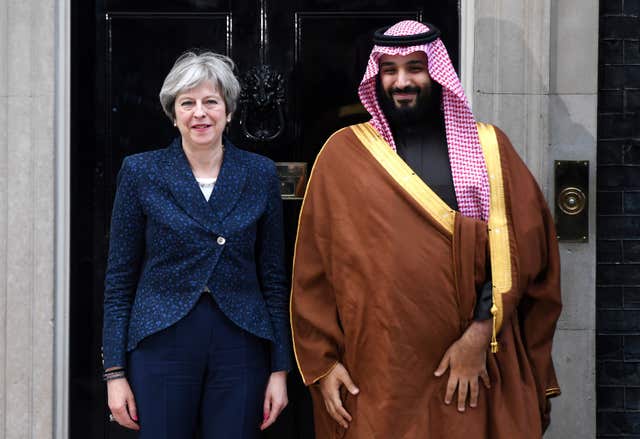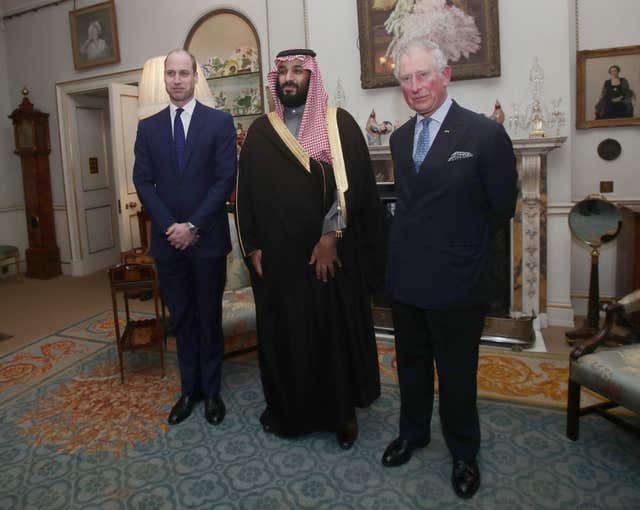
Saudi Arabia is targeting children in the brutal war in Yemen with a “growing sense of impunity”, a charity chief has warned as the country’s key power player completed a high-profile visit to the UK.
Killing and subjecting minors to appalling violence is becoming “normalised” in conflict zones around the world, Save the Children chief executive Kevin Watkins warned.
He spoke on the final day of a three-day official visit and charm offensive by Saudi Arabia’s Crown Prince Mohammed bin Salman – which included talks with Prime Minister Theresa May, the Archbishop of Canterbury, and an audience with the Queen.
Downing Street said the Prime Minister raised the situation in Yemen with the Saudi royal.
As the UK continues to #Welcome_Saudi_Crown_Prince, we have one message for him: #DontBombChildren.Join us and stand up for Yemen’s children > https://t.co/dlqT0AYOr6 pic.twitter.com/WNSIeMY0rB
— Save the Children UK (@savechildrenuk) March 9, 2018
The Gulf state is an important defence partner for the UK, but the sale of arms to the country is highly controversial, especially since its intervention in Yemen.
The crown prince is due to hold talks with Defence Secretary Gavin Williamson on Friday.
Mr Watkins criticised the welcome given to the crown prince, saying that in Yemen the Saudis were “orchestrating what will potentially become the worst famine in the last 50 years”.
Speaking in London at the launch of The War On Children, a report into crimes against children in warzones, Mr Watkins said: “It has become acceptable to operate humanitarian blockades which, if not explicitly designed to starve children and harm children, will have that inevitable consequence.
“The fact that we have the head of state of a government that has been operating such a blockade – Saudi Arabia – recently invited to Buckingham Palace and Downing Street while the military … is orchestrating what will potentially become the worst famine in the last 50 years, I think speaks volumes to another aspect of the problem that I want to highlight – the growing sense of impunity surrounding these crimes against children.
“The fact that you can rape, murder, kidnap, bomb schools, bomb clinics with no consequence, speaks I think to the heart of the deeper challenge that we are addressing today.”
 Saudi Arabia’s crown prince Mohammad bin Salman is greeted by Prime Minister Theresa May at 10 Downing Street on the first day of his three-day visit to the UK (Victoria Jones/PA)
Saudi Arabia’s crown prince Mohammad bin Salman is greeted by Prime Minister Theresa May at 10 Downing Street on the first day of his three-day visit to the UK (Victoria Jones/PA)
Yemen, which borders southern Saudi Arabia, has been embroiled in a bloody civil war since 2014 when rebels took over the capital city of Sanaa.
Saudi Arabia is the main player in a coalition supporting the Yemeni government against the Houthis in a war which has caused a humanitarian catastrophe.
Prince Salman, 32, is the son of the 82-year-old Saudi king and his visit comes at a time when he is taking steps to modernise the ultra-conservative Arab state.
Ahead of his visit, the crown prince signalled the importance of the UK-Saudi Arabia relationship to security, saying both countries would be “much safer if you have a strong relationship with Saudi Arabia”.
 The Prince of Wales with Prince Mohammed bin Salman and the Duke of Cambridge before they had dinner at Clarence House, London (Yui Mok/PA)
The Prince of Wales with Prince Mohammed bin Salman and the Duke of Cambridge before they had dinner at Clarence House, London (Yui Mok/PA)
The crown prince was treated to a private dinner with the Prime Minister at Chequers on Thursday night and has also met with the Prince of Wales and Duke of Cambridge.
Downing Street said trade deals worth £65 billion had been agreed during the visit, which were “important both for our economy and the economy of Saudi Arabia”.
Regarding Mrs May’s meeting, a Downing Street spokesman said: “The Prime Minister raised our deep concerns at the humanitarian situation in Yemen.
“The Prime Minister and Crown Prince agreed on the importance of full and unfettered humanitarian and commercial access, including through the ports, and that a political solution was ultimately the only way to end the conflict and humanitarian suffering in Yemen.”


Why are you making commenting on The Herald only available to subscribers?
It should have been a safe space for informed debate, somewhere for readers to discuss issues around the biggest stories of the day, but all too often the below the line comments on most websites have become bogged down by off-topic discussions and abuse.
heraldscotland.com is tackling this problem by allowing only subscribers to comment.
We are doing this to improve the experience for our loyal readers and we believe it will reduce the ability of trolls and troublemakers, who occasionally find their way onto our site, to abuse our journalists and readers. We also hope it will help the comments section fulfil its promise as a part of Scotland's conversation with itself.
We are lucky at The Herald. We are read by an informed, educated readership who can add their knowledge and insights to our stories.
That is invaluable.
We are making the subscriber-only change to support our valued readers, who tell us they don't want the site cluttered up with irrelevant comments, untruths and abuse.
In the past, the journalist’s job was to collect and distribute information to the audience. Technology means that readers can shape a discussion. We look forward to hearing from you on heraldscotland.com
Comments & Moderation
Readers’ comments: You are personally liable for the content of any comments you upload to this website, so please act responsibly. We do not pre-moderate or monitor readers’ comments appearing on our websites, but we do post-moderate in response to complaints we receive or otherwise when a potential problem comes to our attention. You can make a complaint by using the ‘report this post’ link . We may then apply our discretion under the user terms to amend or delete comments.
Post moderation is undertaken full-time 9am-6pm on weekdays, and on a part-time basis outwith those hours.
Read the rules here